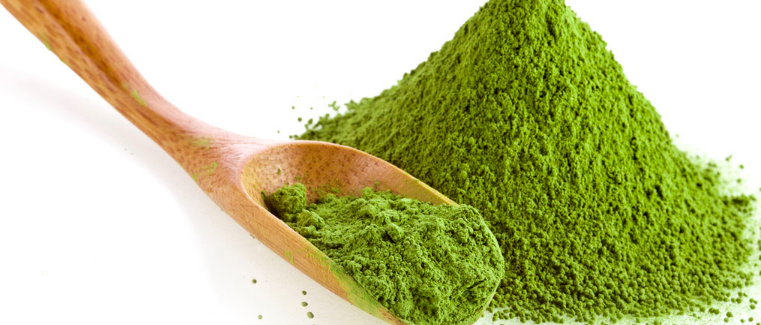Plant-based Protein Powder Supplements are not always my favorite source of nutrition. And sometimes, they are a pure scam. For instance, antioxidants don’t work. At least not in supplement form. The discoveries about antioxidants in the 80s were promising, but long-term studies showed that the health benefits only happen when we get antioxidants from real vegetables. Not when we take them as supplements. You would never know this by reading any of the mainstream or even alternative media. That’s because vitamins and supplements are a multi-billion-dollar-a-year industry.
I only mention this because some people place protein supplements in the same camp as other unproven supplements. Though much of the supplement industry is a complete scam, taking protein powders like this one actually works. Here’s why. Your body doesn’t know the difference between your vegan protein powder, for example, and the protein you get from food. Your cells break down both types of protein into the same amino acids and use them to supercharge your body. Whether it’s protein powder (easy to eat) or calf liver (unthinkable), your cells just see protein. And they LOVE protein. Don’t buy into the crap that you don’t need protein. You’ll feel a hell of a lot better when you actually start getting enough.
Protein is one of three macronutrients – the other two being dietary fat and carbohydrate. All three are necessary to keep your body alive and functioning. If you’re feeling sluggish or weak, pay attention here. You’re probably not getting enough.
Too little protein will affect your weight, your health, and your recovery from exercise. Every cell in your body needs protein to live and renew. Without enough protein, you will feel like crap and you will look like you feel. You will also impair your body’s ability to heal itself, which is vital for your health and lifespan.
Getting enough dietary protein can be tough in a vegetarian or vegan diet.
Plant-based foods aren’t as protein-rich as animal-derived foods. For example, a single egg contains about 6 grams of protein. To get six grams of protein from broccoli would require close to two large cups. That’s a lot of food volume for a relatively small amount of protein. Given that the average woman needs about 50 grams of protein a day, you can see why inexperienced vegans become protein deficient.
Thankfully, there is a simple solution: vegan protein powder.
Because your body doesn’t know the difference between protein from food and protein from supplements, you can add vegan protein powder to your diet without hesitation. If you feel generally hungry or have less than optimal energy, I’d recommend adding it right away. Regardless of the source, protein is broken down into the same amino acids and used in the same way by your cells. That makes it easy to add your own favorite vegan protein powder to a breakfast and lunch or even a smoothie.
Vegan protein powders provide a concentrated source of plant-derived protein, which means that a single serving can provide anywhere between 20 to 30 grams per serving depending on the product in question. That’s about half the amount required in your daily diet. This makes it much easier to get all the amino acids you need to live a healthy vegan lifestyle.
Using Vegan Protein Powder
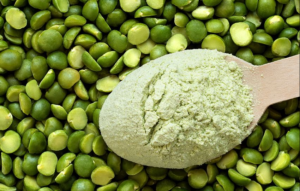
Vegan protein powders are easy to find and can be consumed just about anywhere. For the most part, they are tasty and pleasant to drink, mix easily with water, and can be integrated into many meals. For example, you can pump up the protein content of your morning oatmeal by adding a scoop of vegan protein powder. Easy. Done.
Or, reverse engineer it and turn your protein powder into a more substantial meal. Toss in some soft fruit, some leafy vegetables, nut butter, or coconut oil, and then blend for a delicious protein-rich smoothie.
Believe it or not, vegan protein powders are also ideal for consumption before and after exercise and any time you need a protein boost e.g. when you are too busy to grab a more substantial meal or when you know you need to eat something but aren’t feeling very hungry.
On the downside, not all protein powders were created equal and while there are some excellent products on the market, there are some not-so-good ones too.
How to choose the right protein supplement
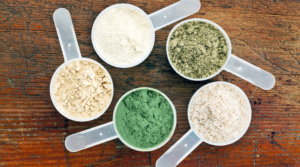
When deciding which protein powder to buy, you should consider the following…
-
Cost Per Serving
Protein supplements are only beneficial if you use them frequently –usually one to three servings per day depending on your protein requirements. If your chosen product is so expensive that you can’t use it regularly, it doesn’t matter how good it is. You often get what you pay for when it comes to vegan protein powders, but don’t assume that the price equates to the quality. Read the label to see what you’re getting. How many grams of protein are in each serving? You may be paying for unnecessary fillers of other vitamin supplements that you don’t need. Let’s take two high-quality vegan protein powders to illustrate.
Garden of Life’s RAW Organic protein powder contains 17 grams of protein for every 22 grams of the powder. In this case, nearly all of the powder is comprised of protein.
That same amount of Vega’s All in One Nutritional has only 10 grams of protein. Only about half the powder is protein. The rest is comprised of vegetable extracts. Both are great products, but they don’t deliver the same amount of protein per dollar spent.
Always check the label for the amount of protein AND the amount of the serving size. Labels can mislead you with a smaller serving size.
-
Artificial Additives
Whether they are in junk food or protein supplements, artificial additives like sweeteners, flavors, preservatives, and colors are generally best avoided. Your body does not process these additives as food. Even vegan protein powder can be unhealthy when it’s full of junk. Check the label and choose products that are free from artificial additives. Your goal is not to replace one source of crap with another. Improve your vitality with real ingredients. Common culprits for artificial sweeteners or thickeners can be found in flavored powders. If you don’t recognize or can’t pronounce an ingredient, keep shopping.
-
Vegan Sources of Protein
You’re looking for a purely plant-based, vegan protein powder. Different protein supplements use different base foods such as rice, soya, peas, milk, and hemp. While hemp and rice are clearly vegan, whey is derived from dairy. If you’re going for strict vegan, make sure you know the food from which the protein has been extracted. Your body won’t ever know the difference but your mind will. Be especially careful when purchasing protein blends or premade protein shake mixes. Read the fine print to make informed decisions.
-
Taste
Vegan protein powders come in plain or flavored. Don’t let the threat of artificial flavors dissuade you from finding a tasting powder. Just read the labels before you buy. When it comes to taste, the true test for vegan protein powder is how it tastes mixed with plain water. Some have a thick, smoothie-like texture and taste great while others are watery and bland or even unpleasant. Depending on how you plan to use your vegan protein powder, you’ll have different requirements for taste. Bland is fine if you’re mixing it into a flavorful smoothie and you don’t want your protein powder dominating the taste. For something less elaborate (mixing it with almond milk, for instance) it’s worth finding the right flavor for your buds. Taste buds. Needless to say, you should try before you buy and avoid bulk buying any products you have not yet taste tested.
-
Carb Content
Warning: Simple carbohydrates, specifically sugar and flour, will fatten you up. Even a little bit too much, on a consistent basis will make it impossible to get skinny. Unfortunately, some vegan protein powders are high in carbs, which you don’t need. Most vegans get plenty of carbs through nutrient-rich, plant-based diets. If you’re highly physically active (about to run a big race), you’ll need carbs for energy. When you’re not super active, a lower carb intake is required if you want to stay skinny.
When it comes to vegan protein powders, you have several choices (soy, pea, hemp, and rice as the most common). Some sources inherently have more carbohydrates and some powders contain added carbohydrates. Read the label for added ingredients and be aware that a flavored powder will naturally contain more carbs.
-
Organic versus non-organic
Organic protein supplements are produced without man-made pesticides, herbicides, or insecticides. There are some health concerns over the use of chemicals in farming and food manufacture so if you share these concerns, choose an organic vegan protein powder. Be aware that most food producers have learned how to get around the “organic” label by using naturally occurring pesticides. Compounds like pyrethrins, for instance, are considered organic because they are derived from nature. They are very powerful insecticides that are known to be toxic to humans and harmful to bees. And they are allowed to be used for organic farming. Before you spend too much time and money seeking out organic supplements, keep in mind that you might not be avoiding pesticides after all. That goes for all of our food too, but that’s another article.
-
Allergies
Just like certain foods, some protein powders can trigger allergies. Soy is a known allergen and rice protein may also contain gluten – another substance that can cause allergic reactions in sensitive individuals. Make sure that, whichever product you choose, is free from anything to which you may be allergic.
Type of protein supplement
There are several different main types of protein powder to choose from…
-
Soya protein
-
Pea protein
-
Rice protein
-
Hemp protein
-
Mixed protein
-
Whey and casein protein
Soy Protein Powder
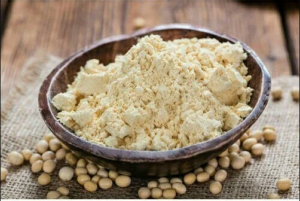
Soybeans are a cholesterol-free member of the legume family. They are very low in saturated fat and provide benefits to people all over the globe.
Soya protein is a complete source of high-quality protein (meaning it contains all 9 essential amino acids) especially suitable for vegetarians and vegans alike. It is free from lactose although some people are allergic to soy and soya products. Because of its global popularity, soy has been researched in countless trials and medical studies. Soy protein itself has also been thoroughly investigated.
According to the NIH (National Institutes for Health):
Soy protein products offer benefits to women in various life stages. Benefits include improved diet and cardiovascular status, prevention of certain types of cancer, improved health following menopause, obesity prevention/control, and more options for food variety.
While soya is a great protein powder, there remains controversy over elevated estrogen levels. If you have been advised by your doctor to avoid soy products for this reason, soy protein should also be avoided.
One serving of soy protein isolate (23-gram scoop) contains 46% of the daily value of protein and 22% of the iron you need. It also contains 5% of needed calcium. It’s easy to see why soy protein is the most popular vegan protein powder.
Pea Protein Powder
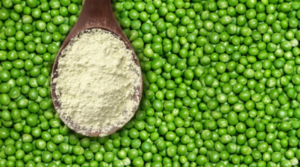
On their own, peas are an impressive legume. Though they are extremely low in fat, peas contain high levels of omega-3 fats in the form of alpha-linolenic acid (ALA) as well as high levels of omega-6 fatty acid. Peas are full of potassium, manganese, and a variety of other fantastic vitamins. Because peas are also high in protein, it didn’t take long to discover the use of pea protein powder.
Pea Protein powder is highly digestible, seldom causes allergic reactions, and is very filling. It contains the same level of protein per serving as soy protein powder without the allergic side effects that can come with soy. Pea protein powder is ideal for people looking to lose weight or to satisfy hunger. However, because it is missing one of the nine essential amino acids, it is not classed as a complete protein.
Don’t let “incomplete protein” scare you away. All that means is that pea protein powder does not contain all 9 amino acids that you need from your diet. You can remedy this with a serving of rice and beans or any other complete protein. Contrary to what is often repeated, you don’t need to consume all your amino acids in a single setting. Your body collects all the amino acids it needs from your various sources of protein throughout the course of the day—or even the week.
Pea protein powder is a great alternative to animal-based proteins and is not a known allergen, so everybody wins.
Rice Protein Powder
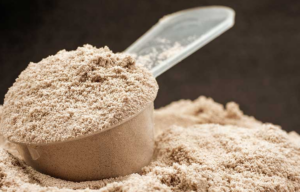
When most people think of rice, they don’t think of protein and they definitely don’t think of protein powder. Brown rice (the source of rice protein powder), contains 10% of your daily protein requirement per cup. Strip away all the rice, and you’re left with concentrated protein, which is easily converted to a rice protein powder. Because your body doesn’t recognize the difference between protein from the food itself, and an isolated protein molecule, rice protein powder will nourish your body just as effectively.
Like pea protein, rice protein powder is also incomplete, meaning your body will have to find the missing amino acid from another food source. Not to worry. Beans, peas, and rice are all good complementary proteins that fill the amino acid gaps.
Hemp Protein Powder
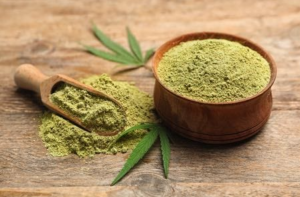
Hemp is quickly becoming a favorite nutrition source and is arguably the best source of plant-based protein. Shelled hemp seeds not only contain a huge protein boost, but they also provide a whopping serving of dietary fat and a solid 16% of daily iron. Hemp protein contains all 21 amino acids (including the 9 that we can’t make on our own).
You can cook the seeds and eat them whole, or enjoy things like hemp milk and hemp protein powder to add a boost of protein and nutritional benefit to your meals.
Hemp protein powder provides a very high-quality protein and is as complete as any animal-based protein can be. Additionally, it is high in anti-inflammatory omega-6 fatty acids and is also high in fiber. Because its use is still fairly limited, hemp protein powder is more likely to be organic and less likely to be genetically modified. Get it while the gettin’s good!
Mixed Vegan Protein Powders
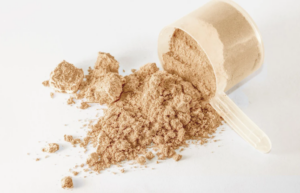
If you’ve read about each of the common vegan protein powders and you’re down here at the end of this article, you’re probably starting to think it would make more sense to combine some of them. Particularly in cases where all the amino acids are not present. Enter Mixed vegan protein powders.
They use several different ingredients to provide a well-rounded protein supplement. This often includes combining pea and rice protein to produce a complete amino acid-rich protein source and may also include “added extras” such as probiotics and supplementary vitamins and minerals designed to make up any nutritional shortfalls e.g. iron and calcium which can become low in a vegan diet.
If you’re considering a mixed product, read the label to make sure you’re not paying for additional supplements you don’t actually need or fillers and additives that don’t contribute to your health. As with any bottled product, be vigilant about checking labels for food allergens.

